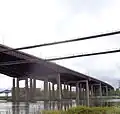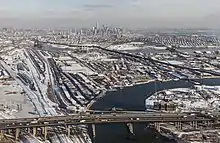Chaplain Washington-Harry Laderman Bridge
The Chaplain Washington and Harry Laderman Bridges, or the Chaplain Washington Memorial Bridge and Laderman Memorial Bridge, are a pair of bridges that carries the New Jersey Turnpike (Interstate 95) across the Passaic River in northeastern New Jersey. The Washington Bridge built in 1952 and carries the eastern spur of the turnpike;[3] the Laderman Bridge was built in 1970 and carries the western spur.
Harry Laderman Bridge | |
|---|---|
 The Harry Laderman and Chaplain Washington bridges seen from the Passaic River looking downstream | |
| Coordinates | 40.7420489°N 74.1229440°W |
| Carries | |
| Crosses | Passaic River |
| Locale | Kearny, New Jersey and Newark, New Jersey |
| Other name(s) | Washington & Laderman Memorial Bridge |
| Named for | John P. Washington, U.S. Army lieutenant during World War II; Harry Laderman, late employee of the NJTA |
| Owner | New Jersey Turnpike Authority (NJTA) |
| Maintained by | NJTA |
| Characteristics | |
| Total length | 7,294 feet (2,223 m) |
| Width | 104 feet (32 m) |
| No. of lanes | 16 (8 on Washington Bridge, 8 on Laderman; 6 northbound, 6 southbound, 4 shoulder lanes) |
| History | |
| Opened | 1952 (Washington Bridge); 1970 (Laderman Bridge) |
| Location | |
| References | |
| [1] [2] | |
Location
When passing over the Passaic the bridges cross the county line at Newark in Essex County and Kearny in Hudson County.
In Newark, the viaducts leading to the bridges align for the southbound merge/northbound separation of the eastern and western spurs just north of the interchange with I-78, which the New Jersey Turnpike Authority (NJTA) refers to as the Southern Mixing Bowl.[4]
The southern end of the bridges is just south of the Pulaski Skyway (U.S. 1-9), under which they pass.[5][6] As they ascend/descend they pass by the Essex County Resource Recovery Facility and over the Conrail Passaic and Harsimus Line.
In Kearny, the bridges traverse the railroad right-of-way of the PATH system, the Conrail Center Street Branch, NJ Transit Rail Operations, and the Northeast Corridor. They soon enter the Kearny Marshes of New Jersey Meadowlands, where they diverge[7][8] and soon cross over the Newark-Jersey City Turnpike (CR 508).
The Laderman Bridge reaches its northern end in Saw Mill Creek Wildlife Management Area at the Belleville Turnpike.[9] The western spur continues crosses the Hackensack River in Bergen County.
The Chaplain Washington Bridge ends before the Belleville Turnpike at and the eastern spur briefly touches ground before ascending to cross the Hackensack on the Lewandowski Bridge.[10]
History and designation
Built in 1952 as part of the then-mainline route, now the eastern spur, of the New Jersey Turnpike, the Chaplain Washington span is named after Lieutenant John P. Washington, who was one of 4 chaplains who gave their lives to save soldiers during the sinking of the SS Dorchester in World War II. 18 years later, the Harry Laderman bridge opened directly east of the Washington Bridge as part of the building of the turnpike's western spur extension. This bridge is named after toll booth operator Harry Laderman, an employee of the New Jersey Turnpike Authority who died on the job after a truck slammed into his toll booth at Exit 16E, killing him.[11][12]
Refurbishment
The NJTA estimates that both the Harry Laderman and Chaplain Washington bridges have the highest rate of truck traffic throughout the entire NJ Turnpike system of highways.[2] The Laderman is rated as structurally deficient on the National Bridge Inventory condition rating scale with numerous cracks, flares, and structural fatigue.[1][13] The NJTA announced plans in 2014[14] to rehabilitate the bridge and investigate the structural integrity of the bridge and how to repair it.[2] As of 2019, the bridge’s rehabilitation was about 69 percent complete.[13]
Gallery
 Chaplain Washington Bridge passing under the Pulaski Skyway (1952)
Chaplain Washington Bridge passing under the Pulaski Skyway (1952) Laderman and Chaplain Washington bridges seen from PATH train
Laderman and Chaplain Washington bridges seen from PATH train Crossing the Passaic and rail lines upstream of Point-No-Point Bridge
Crossing the Passaic and rail lines upstream of Point-No-Point Bridge
See also
References
- "NJTPK SNW&NSW RWY over PASSAIC RIV PCRR CRR CON". The Daily Advertiser. Retrieved September 2, 2023.
- "Laderman Memorial Bridge". Arora and Associates. Retrieved September 1, 2023.
- https://www.state.nj.us/transportation/capital/stip0918/pdf/stip_vol2.pdf
- NJTA. "Roadway Names" (PDF). New Jersey Turnpike Authority. Retrieved September 4, 2023.
- Mall, Scott (November 30, 2021). "Infrastructure: New Jersey Turnpike dedicated 70 years ago (Part 1)". FreightWaves.
- New Jersey Department of Transportation. "Route 95W Straight Line Diagram" (PDF). New Jersey Department of Transportation. Archived (PDF) from the original on January 13, 2016. Retrieved September 5, 2023.
- "Kearny Freshwater Marsh (Kearny)". New Jersey Sports and Exposition Authority.
- "DEP Launches Project to Encapsulate 1970s-era Landfill in Heavily Traveled Transportation Hub in Kearny" (Press release). New Jersey Department of Environmental Protection. June 12, 2017.
- "Saw Mill Creek Wildlife Management Area (Kearny and Lyndhurst)". New Jersey Sports and Exposition Authority.
- "RIME Team wins Grand Award with the Project Team for the Lewandowski Memorial Hackensack River Bridge". Rutgers Infrastructure Monitoring and Evaluation Group/Intelligent Bridge Engineering and Advanced Materials Laboratory. June 16, 2015. Retrieved September 7, 2023.
- Sue (April 28, 2013). "Hidden names bridging the Turnpike". Hidden New Jersey. Retrieved August 29, 2023.
- "Harry Samuel Laderman". geni_family_tree. December 10, 1917. Retrieved September 1, 2023.
- Salant, Jonathan D.; Higgs, Larry (March 25, 2021). "These N.J. bridges are in the worst shape and really need repairs". NJ.com. Retrieved August 29, 2023.
- "N/A" (PDF). New Jersey Turnpike Authority. February 26, 2014. Retrieved August 31, 2023.